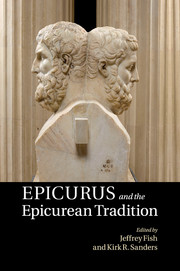Book contents
- Frontmatter
- Contents
- Acknowledgements
- Note on Abbreviations
- List of Contributors
- 1 Introduction
- 2 Autodidact and student: on the relationship of authority and autonomy in Epicurus and the Epicurean tradition
- 3 Epicurus' theological innatism
- 4 Epicurus on the gods
- 5 Not all politicians are Sisyphus: what Roman Epicureans were taught about politics
- 6 Epicurean virtues, Epicurean friendship: Cicero vs the Herculaneum papyri
- 7 Cicero's use and abuse of Epicurean theology
- 8 The necessity of anger in Philodemus' On Anger
- 9 Philodemus, Seneca and Plutarch on anger
- 10 Philodemus and the fear of premature death
- Bibliography
- General index
- Index of passages
6 - Epicurean virtues, Epicurean friendship: Cicero vs the Herculaneum papyri
Published online by Cambridge University Press: 01 June 2011
- Frontmatter
- Contents
- Acknowledgements
- Note on Abbreviations
- List of Contributors
- 1 Introduction
- 2 Autodidact and student: on the relationship of authority and autonomy in Epicurus and the Epicurean tradition
- 3 Epicurus' theological innatism
- 4 Epicurus on the gods
- 5 Not all politicians are Sisyphus: what Roman Epicureans were taught about politics
- 6 Epicurean virtues, Epicurean friendship: Cicero vs the Herculaneum papyri
- 7 Cicero's use and abuse of Epicurean theology
- 8 The necessity of anger in Philodemus' On Anger
- 9 Philodemus, Seneca and Plutarch on anger
- 10 Philodemus and the fear of premature death
- Bibliography
- General index
- Index of passages
Summary
Philodemus claims in On Death (De morte) that Epicureans, ‘though unaware through some unavoidable cause that now, and quickly, the paragraph-mark and end of life was approaching, the minute this becomes visible to the eye, can take swiftest survey of it in a manner that is a mystery unspeakable to the uninitiate (ἀρρήτως τοῖς ἀγνοοῦσιν). Because of their having enjoyed everything, and because of the complete lack of perception that they know will engulf them, they breathe their last in such calm as if they had never turned their attention away from death for a moment.’
Similar language of mystery and initiation is frequent in Epicurean ethical discourse. The ‘mystery’ of friendship is set forth in VS 52: ‘Friendship dances round the whole civilized world, heralding to us in very deed to awake and call each other blessed’ (ἡ φιλία περιχορεύει τὴν οἰκουμένην κηρύττουσα δὴ πᾶσιν ἡμῖν ἐγείρεσθαι ἐπὶ τὸν μακαρισμόν). Cyril Bailey ignores the mystery-initiation language in his note on the passage. A. J. Festugière, however, showed convincingly that ‘[t]he whole sentence is full of reminiscences of the language peculiar to Greek mysticism’. The ‘heralding’ is that of the Eleusinian mysteries, which from the very start had hereditary heralds, or Kerykes – as well as that of Hermetic mysticism. ‘Awaking’ is also a term with mystic connotations, as in the Pauline sentence ‘Awake thou that sleepest (ἔγειρε ὁ καθεύδων) and arise from the dead, and Christ shall give thee light.
- Type
- Chapter
- Information
- Epicurus and the Epicurean Tradition , pp. 105 - 128Publisher: Cambridge University PressPrint publication year: 2011
- 4
- Cited by



